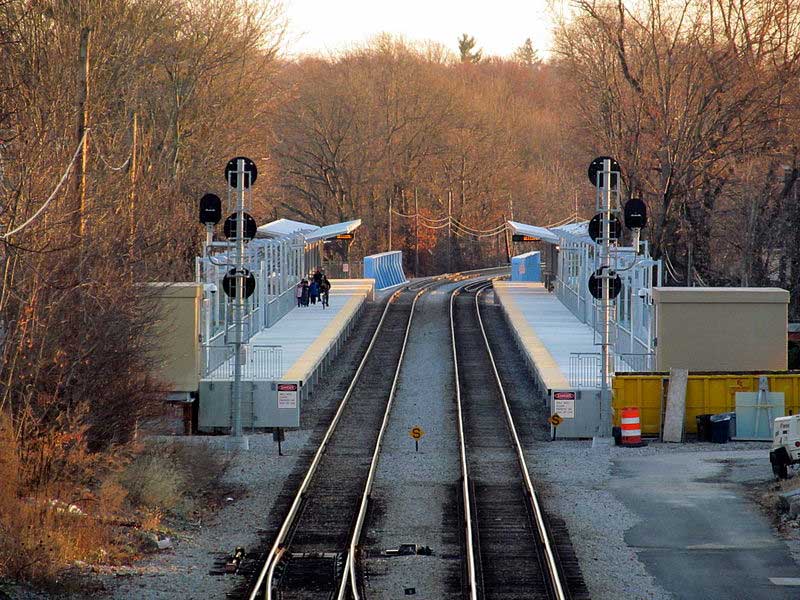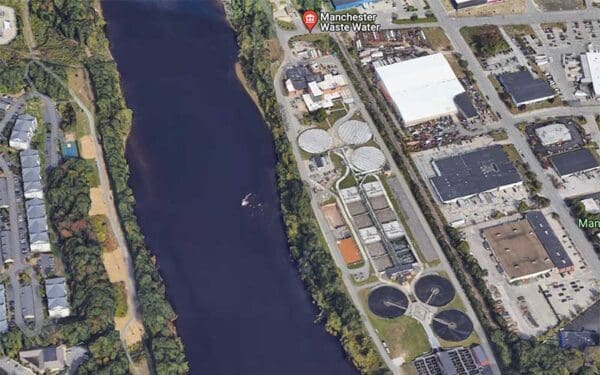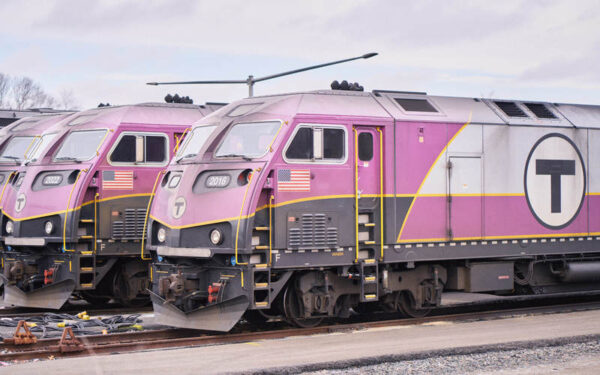
Extending the Fairmount Indigo Line to Foxborough should be a boon to all riders. But if not done right, it could end up hurting the riders the line was originally meant to help. Photo: Pi.1415926535/CC via Attribution Share-Alike 3.0
In a recent national article, the Massachusetts Bay Transportation Authority (MBTA) was lauded for developing a commuter rail line that serves primarily low-income, working-class riders in communities of color, when throughout the United States commuter rail almost exclusively caters to affluent, white suburbanites. The article notes that the MBTA’s Fairmount Line could be a national model, but that it’s not there yet.
A proposal to extend Fairmount Line service out to Foxborough could make or break the line’s model status. If done right, the extension could provide a broad new swath of commuters with public transit into the city, while also improving service for its current riders. But, if done as currently proposed, it risks degrading service for its city-based, low-income, and working-class riders.
Fighting for Fairmount
CLF has long been a booster of the Fairmount Line, which runs almost entirely through Boston. The line progresses from South Station through environmental justice neighborhoods of Dorchester, Mattapan, and Hyde Park to Readville. But until 2012, the Fairmount Line failed to provide service for most of the communities through which it runs.
Over the years, together with our partners in the Fairmount Indigo Transit Coalition, CLF successfully fought for service for these neighborhoods. As part of the state’s Big Dig transit commitments secured and enforced by CLF, three stations were added to the line between 2012 and 2013 (Talbot Avenue, Newmarket, and Four Corners/Geneva), and a fourth station at Blue Hill Avenue will open in 2019.
At the same time, CLF and the coalition successfully advocated for providing service on the weekend and for riders to pay subway fares rather than the more expensive commuter rail fares. Most recently, we effectively fought back against disproportionate cancellations of trains on the line compared to other commuter rail lines. Our remaining goals for the line (to be called the “Indigo Line” in the future) are trains on the line that run as frequently as the subway, a faster trip, and, ultimately, the use of electric trains.
Foxborough Extension Could Put Current Riders’ Service and Our Vision at Risk
This vision has recently been put at risk by a new, and unusual, threat: a proposed pilot for the extension of commuter rail service to Foxborough, the home of the New England Patriots. Currently, the MBTA provides commuter rail service only on game days. The proposed pilot would add regular weekday service during morning and afternoon rush hours and limited midday service.
While CLF supports the idea of commuter rail serving Foxborough, the pilot, as proposed, poses significant risks to the current service of the Fairmount Line and the greater vision for it:
- Increased Cancellations and Delays: As proposed, the service to Foxborough would begin in the morning at the Readville station without passengers. It would run to and from Foxborough prior to the beginning of the current schedule of the Fairmount Line. If a train is delayed or breaks down during this loop, service on the line, which has already been unreliable, would be affected before it has even picked up a single passenger in the current service corridor.
- Limited Service from Fairmount Corridor to Foxborough: Likewise, since the first train to Foxborough would begin in Readville rather than at the South Station, Fairmount Line riders would not be able to easily travel south, squandering any potential economic development opportunity for our communities.
- Potential Limited Train Capacity: Proponents of the pilot only project an additional 150 riders to board at Foxborough. But with 500 parking spaces at the station, it’s possible that all of the seats on the train could be filled by the time it reaches Readville. This could result in the terrible situation in which all Foxborough riders, likely white, will be sitting, while regular riders of the Fairmount Line, more likely people of color, will be standing on the way to South Station. This is particularly concerning, as a fourth new station on the Fairmount Line is currently under construction and would open during the duration of the pilot.
- Permanent Commuter Rail Service rather than Rapid Transit Service: Service to Foxborough might put the attainable goal of increased frequency and reduced travel time out of reach for the Fairmount Line, as the longer trip would make it less likely that the MBTA would employ shorter train sets on the line. Shorter train sets, which the MBTA has already tested on the line, could accelerate faster and run slightly more quickly through curves, reducing travel time by as much as 20 percent.
Small Changes Could Improve the Proposal – and Service for All
Commuter rail service for one community should not have to hurt another one. CLF supports a redesign of the proposed pilot that would benefit both the Fairmount Line’s current riders and commuters from Foxborough who would like to avoid driving to Boston. If the pilot were implemented together with measures that help the current riders on the Fairmount Line, such as increased frequency, shorter travel times, the ability to use Charlie cards on the train, and assurances that bi-level cars would be deployed in case ridership from Foxborough exceeds expectations, this collision course could be avoided. Instead, the pilot could turn into a win-win situation for the MBTA and the Fairmount Line could still become a national model.
You Can Help
On Monday, August 14, the MBTA’s Fiscal and Management Control Board (FMCB) will decide on the future of this pilot. If you want to take action, please sign the petition posted by our partner, the Fairmount Indigo CDC Collaborative today.




